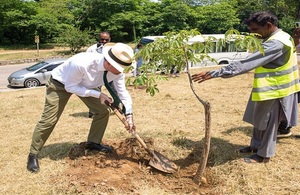British High Commission staff plant 75 trees to mark 75 years of UK – Pakistan relations
World news story
On Friday to commemorate 75 years of UK – Pakistan relations, British High Commission staff joined by Chevening alumni and personnel from the Islamabad Capital Development Authority, planted 75 trees native to Pakistan, in the Shakarparian National Park.

Acting British High Commissioner, Andrew Dalgleish, plants 1 of 75 trees to mark 75 years of UK – Pakistan relations.
This activity complements a vast year-long tree planting programme carried out in the UK by the British Pakistan Foundation and Pakistan High Commission. Named ‘The Legacy Project’, this was launched to celebrate the achievements of British Pakistanis over the last 75 years. A total of 7,500 trees are set to be planted.
The UK – Pakistan relationship has gone from strength to strength this year, with major events such as the independence anniversary and the Birmingham Commonwealth Games revitalising deep people-to-people ties.
On the occasion the Acting British High Commissioner Andrew Dalgleish said:
Right now the UK and Pakistan are collaborating to tackle some of the world’s most pressing challenges from driving forward action on climate change to improving gender equality. I know that we will continue to do so over the next seventy-five years. Happy Birthday, happy Independence Day, Azm-e-aali Shaan, Shaad rahe Pakistan!
Notes to editors:
-
Tackling climate change is the UK’s top international priority and a key area of collaboration with Pakistan. Pakistan is suffering from some of the worst effects of climate change, but showed the world that great ambition is possible through its NDC commitments made ahead of COP26. At COP26 the UK pledged financial support to help Pakistan fight climate change, promote more sustainable water use, and unlock climate investment. The UK also helped to mobilise 31 leading Pakistani businesses to commit to net zero emissions by 2050, through the Race to Zero campaign.
-
As hosts of COP26 (co-hosted with Italy), the UK has been driving international action and support to adapt to the effects of climate change, which are already impacting lives, livelihoods and natural habitats across the world. Thirty five countries have joined the Adaptation Action Coalition, and over 2,000 businesses, investors, regions, cities and other non-state actors have joined the Race to Resilience. Over 40 countries and organisations have joined the Risk-Informed Early Action Partnership, committing to make 1 billion people safer from disaster by 2025. Pakistan participated in the COP26 and the PM Boris Johnson appreciated Pakistan’s ambitious country goal which should serve as a blue print in climate action.
-
The Climate Finance Accelerator (CFA) is a £10.8 million technical assistance programme funded by International Climate Finance (ICF), through the UK Government’s Department for Business, Energy and Industrial Strategy (BEIS). The CFA is implemented in eight countries (Colombia, Egypt, Mexico, Nigeria, Pakistan, Peru, South Africa and Turkey) and is working to develop a sustainable pipeline of bankable, low-carbon projects in each country. The CFA is part of the UK’s efforts to support climate action on a global scale, facilitating access to finance and helping governments achieve climate targets under the Paris Agreement. Pakistan is also a beneficiary country and should make use of these funds in the battle against climate challenge.
-
In celebration of the achievements of British Pakistanis during the last 75 years in the UK, ‘The Legacy Project’ was launched at the Pakistan High Commission London on 18 July 2022. The Project is a collaborative effort by the British Pakistan Foundation (BPF) in partnership with the National Trust, World Congress of Overseas Pakistanis (WCOP), The Pakistan Society, and a host of other British Pakistani organizations.
For updates on the British High Commission, please follow our social media channels:
Contact:
British High Commission
Islamabad
Tel: 0300 500 5306
Last updated 12 August 2022 + show all updates
-
Edited First Para
-
First published.

